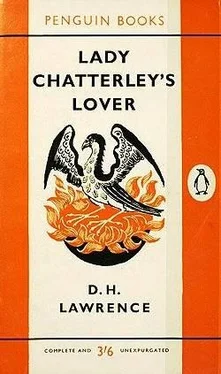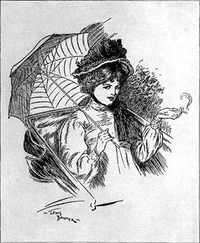Sir Geoffrey would have none of the absurdity. He was pale and tense, withdrawn into himself, and obstinately determined to save his country and his own position, let it be Lloyd George or who it might. So cut off he was, so divorced from the England that was really England, so utterly incapable, that he even thought well of Horatio Bottomley. Sir Geoffrey stood for England and Lloyd George as his forebears had stood for England and St George: and he never knew there was a difference. So Sir Geoffrey felled timber and stood for Lloyd George and England, England and Lloyd George.
And he wanted Clifford to marry and produce an heir. Clifford felt his father was a hopeless anachronism. But wherein was he himself any further ahead, except in a wincing sense of the ridiculousness of everything, and the paramount ridiculousness of his own position? For willy-nilly he took his baronetcy and Wragby with the last seriousness.
The gay excitement had gone out of the war…dead. Too much death and horror. A man needed support and comfort. A man needed to have an anchor in the safe world. A man needed a wife.
The Chatterleys, two brothers and a sister, had lived curiously isolated, shut in with one another at Wragby, in spite of all their connexions. A sense of isolation intensified the family tie, a sense of the weakness of their position, a sense of defencelessness, in spite of, or because of, the title and the land. They were cut off from those industrial Midlands in which they passed their lives. And they were cut off from their own class by the brooding, obstinate, shut-up nature of Sir Geoffrey, their father, whom they ridiculed, but whom they were so sensitive about.
The three had said they would all live together always. But now Herbert was dead, and Sir Geoffrey wanted Clifford to marry. Sir Geoffrey barely mentioned it: he spoke very little. But his silent, brooding insistence that it should be so was hard for Clifford to bear up against.
But Emma said No! She was ten years older than Clifford, and she felt his marrying would be a desertion and a betrayal of what the young ones of the family had stood for.
Clifford married Connie, nevertheless, and had his month's honeymoon with her. It was the terrible year 1917, and they were intimate as two people who stand together on a sinking ship. He had been virgin when he married: and the sex part did not mean much to him. They were so close, he and she, apart from that. And Connie exulted a little in this intimacy which was beyond sex, and beyond a man's 'satisfaction'. Clifford anyhow was not just keen on his 'satisfaction', as so many men seemed to be. No, the intimacy was deeper, more personal than that. And sex was merely an accident, or an adjunct, one of the curious obsolete, organic processes which persisted in its own clumsiness, but was not really necessary. Though Connie did want children: if only to fortify her against her sister-in-law Emma.
But early in 1918 Clifford was shipped home smashed, and there was no child. And Sir Geoffrey died of chagrin.
Connie and Clifford came home to Wragby in the autumn of 1920. Miss Chatterley, still disgusted at her brother's defection, had departed and was living in a little flat in London.
Wragby was a long low old house in brown stone, begun about the middle of the eighteenth century, and added on to, till it was a warren of a place without much distinction. It stood on an eminence in a rather line old park of oak trees, but alas, one could see in the near distance the chimney of Tevershall pit, with its clouds of steam and smoke, and on the damp, hazy distance of the hill the raw straggle of Tevershall village, a village which began almost at the park gates, and trailed in utter hopeless ugliness for a long and gruesome mile: houses, rows of wretched, small, begrimed, brick houses, with black slate roofs for lids, sharp angles and wilful, blank dreariness.
Connie was accustomed to Kensington or the Scotch hills or the Sussex downs: that was her England. With the stoicism of the young she took in the utter, soulless ugliness of the coal-and-iron Midlands at a glance, and left it at what it was: unbelievable and not to be thought about. From the rather dismal rooms at Wragby she heard the rattle-rattle of the screens at the pit, the puff of the winding-engine, the clink-clink of shunting trucks, and the hoarse little whistle of the colliery locomotives. Tevershall pit-bank was burning, had been burning for years, and it would cost thousands to put it out. So it had to burn. And when the wind was that way, which was often, the house was full of the stench of this sulphurous combustion of the earth's excrement. But even on windless days the air always smelt of something under-earth: sulphur, iron, coal, or acid. And even on the Christmas roses the smuts settled persistently, incredible, like black manna from the skies of doom.
Well, there it was: fated like the rest of things! It was rather awful, but why kick? You couldn't kick it away. It just went on. Life, like all the rest! On the low dark ceiling of cloud at night red blotches burned and quavered, dappling and swelling and contracting, like burns that give pain. It was the furnaces. At first they fascinated Connie with a sort of horror; she felt she was living underground. Then she got used to them. And in the morning it rained.
Clifford professed to like Wragby better than London. This country had a grim will of its own, and the people had guts. Connie wondered what else they had: certainly neither eyes nor minds. The people were as haggard, shapeless, and dreary as the countryside, and as unfriendly. Only there was something in their deep-mouthed slurring of the dialect, and the thresh-thresh of their hob-nailed pit-boots as they trailed home in gangs on the asphalt from work, that was terrible and a bit mysterious.
There had been no welcome home for the young squire, no festivities, no deputation, not even a single flower. Only a dank ride in a motor-car up a dark, damp drive, burrowing through gloomy trees, out to the slope of the park where grey damp sheep were feeding, to the knoll where the house spread its dark brown facade, and the housekeeper and her husband were hovering, like unsure tenants on the face of the earth, ready to stammer a welcome.
There was no communication between Wragby Hall and Tevershall village, none. No caps were touched, no curtseys bobbed. The colliers merely stared; the tradesmen lifted their caps to Connie as to an acquaintance, and nodded awkwardly to Clifford; that was all. Gulf impassable, and a quiet sort of resentment on either side. At first Connie suffered from the steady drizzle of resentment that came from the village. Then she hardened herself to it, and it became a sort of tonic, something to live up to. It was not that she and Clifford were unpopular, they merely belonged to another species altogether from the colliers. Gulf impassable, breach indescribable, such as is perhaps nonexistent south of the Trent. But in the Midlands and the industrial North gulf impassable, across which no communication could take place. You stick to your side, I'll stick to mine! A strange denial of the common pulse of humanity.
Yet the village sympathized with Clifford and Connie in the abstract. In the flesh it was—You leave me alone!—on either side.
The rector was a nice man of about sixty, full of his duty, and reduced, personally, almost to a nonentity by the silent—You leave me alone!—of the village. The miners' wives were nearly all Methodists. The miners were nothing. But even so much official uniform as the clergyman wore was enough to obscure entirely the fact that he was a man like any other man. No, he was Mester Ashby, a sort of automatic preaching and praying concern.
This stubborn, instinctive—We think ourselves as good as you, if you are Lady Chatterley!—puzzled and baffled Connie at first extremely. The curious, suspicious, false amiability with which the miners' wives met her overtures; the curiously offensive tinge of—Oh dear me! I am somebody now, with Lady Chatterley talking to me! But she needn't think I'm not as good as her for all that!—which she always heard twanging in the women's half-fawning voices, was impossible. There was no getting past it. It was hopelessly and offensively nonconformist.
Читать дальше
Конец ознакомительного отрывка
Купить книгу

![Дэвид Лоуренс - Lady Chatterley's Lover [С англо-русским словарем]](/books/26613/devid-lourens-lady-chatterley-s-lover-s-anglo-thumb.webp)










